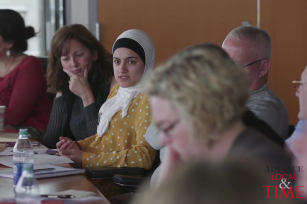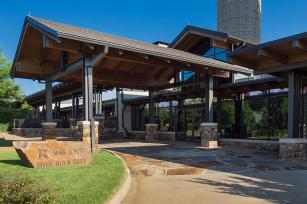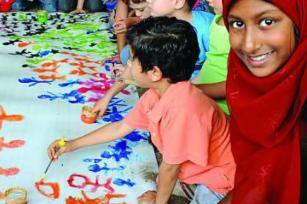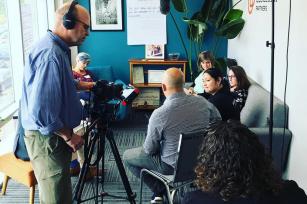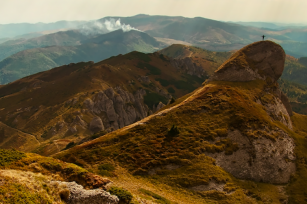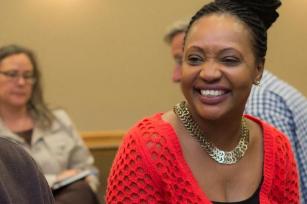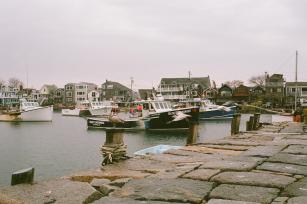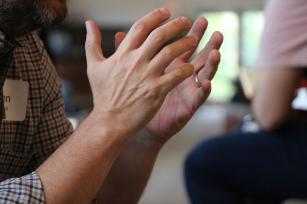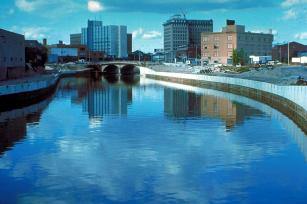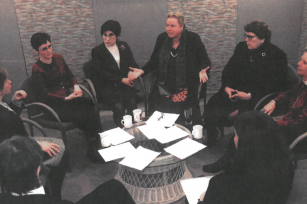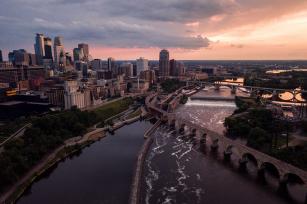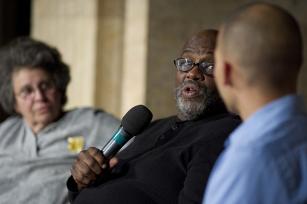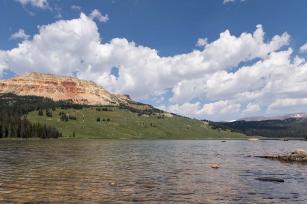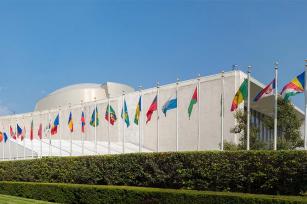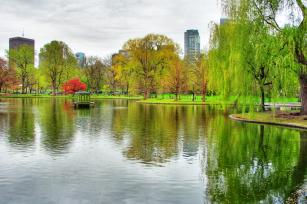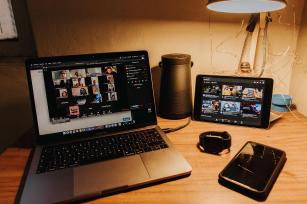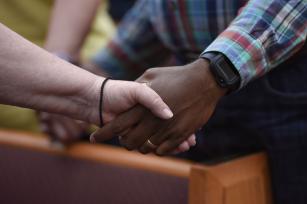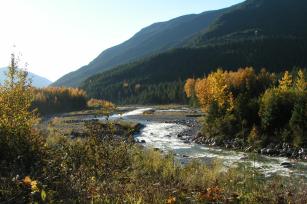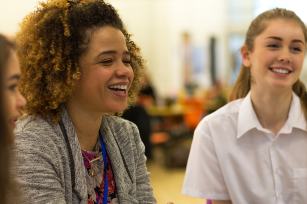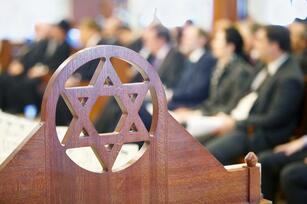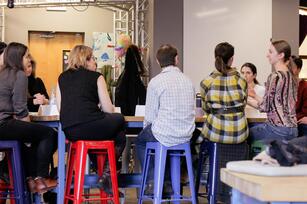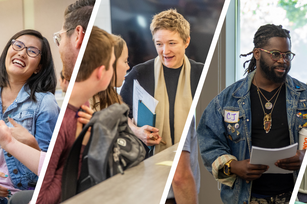
Breadcrumb
- Essential Partners
- Our Impact
- Impact Stories
- Climate Change, Culture, and Heritage with the Union of Concerned Scientists
Climate Change, Culture, and Heritage with the Union of Concerned Scientists
When we talk about climate change, we often envision faraway melting icecaps, or polar bears stranded in an empty arctic tundra. But climate change is already affecting many people across the globe, affecting not only the future, but shared histories as well.
In 2014, the Union of Concerned Scientists (UCS) released a report called “National Landmarks at Risk,” which illuminated how rising seas, floods, and wildfires are “threatening some of the United States’ most cherished historic sites.”
Whether the site is Fort Monroe in Virginia, Ellis Island, or the California coast, climate change will fundamentally alter how you can relate to that place, or in extreme cases, whether that place will even exist.
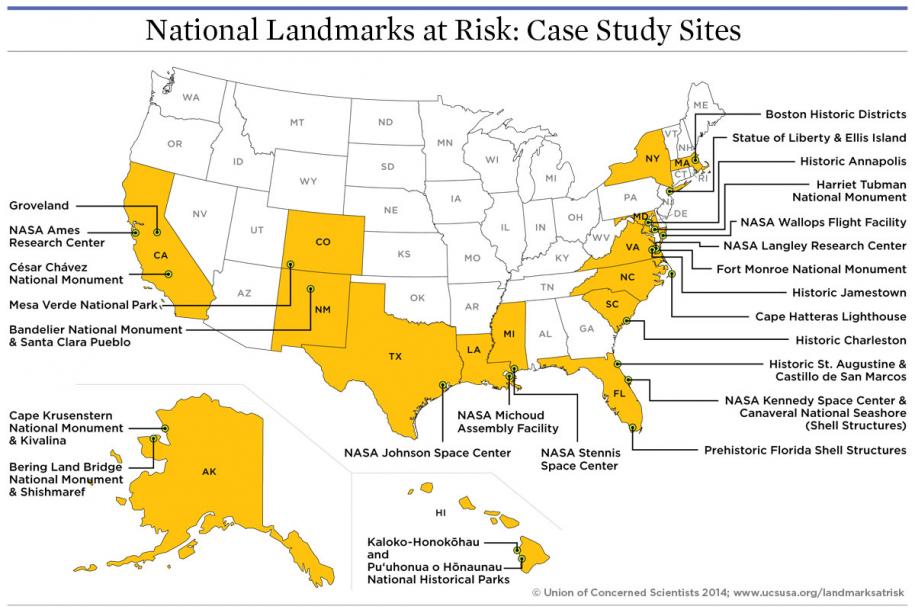
UCS wanted to report on this heightened risk to the nation's most cherished places—and to take action. The next year, UCS invited Essential Partners (then the Public Conversations Project) to facilitate a two-day gathering of experts in historical preservation, archaeology, tribal history and culture, and environmental scientists, among others, to discuss the need for collaboration in facing the future together.
Somewhat ironically, the first day was ushered in by a snowstorm. Think that dampened this crowd? Nope: of the 30 invited participants, 27 showed up.
Climate Change's Threat to Culture
Essential Partners practitioner Mary Jacksteit led a conversation among leaders from across disciplines and continents about shared concerns around environment, heritage, and culture.
Included were representatives of the National Trust for Historic Preservation, the Society for American Archaeological, the International Committee on Monuments and Sites (ICOMOS), the International National Trusts Organization, the World Monuments Fund, as well as the Head of State of the Gullah Geechee nation, and a member of the Native American Bar Association.
The diverse group shared their concerns about losing places of meaning to their families, their communities, and their institutions, and grappled with the implications of climate change for their work.
What made the day a success? To start with, the right people were in the room, thanks a planning committee that had also helped to shape the agenda. The tight time frame and array of perspectives required skilled facilitation. UCS partner Kate Cell particularly valued the “very thoughtful ways that Essential Partners structures conversations to make space for what needs to happen”—asking questions like, “in three years from now, what [in the fields of cultural heritage or climate policy] has changed as a result of this meeting?”
Mary asked everyone to bring an object that represented what each hoped to preserve and maintain in a warming world. Archaeologists brought a particular stone from a certain era; one participant brought an 18th century postcard of a 17th century picture of a 16th century event that connected him to his ancestors. Queen Quet of the Gullah/Geechee Nation brought a sweetgrass basket full of Sea Island rice and cotton. She talked about how her people have survived and thrived in their place through years of enslavement and beyond, picking the cotton, and growing the rice.
A Pledge and Public Statement
The group decided together to create and pledge to a statement that expressed their shared commitment to maintaining cultural heritage in a changing climate.
The group worked through a difficult conversation that arose about how to even define "cultural heritage," a term that has different meanings for many different entities, and has sometimes been defined without the involvement of those whose “culture” is being considered.
Together, the group had to balance crafting language that the government officials among them might be able to sign, while maintaining enough specificity to hold everyone accountable to agreed upon actions and outcomes. The dialogue participants continue to work together towards the shared goals they delineated at the meeting.
Related Impact Stories
Testimonials

Janele Nelson, Mission DirectorIn these divisive times, Essential Partners has given my local YMCA and now the national YMCA a means to build bridges through dialogue, re-establishing foundations for constructive change to occur.
YMCA of Pierce & Kitsap Counties (WA)

Undergraduate StudentI have never heard people talk so openly about race, especially in a class setting. Everyone was respectful and honest at the same time. The dialogue structure helped me learn about my peers and helped me feel more comfortable than I ever have about discussing controversial issues.
Gordon College, Massachusetts

Linda Gryczan, MediatorInstead of demonizing and dehumanizing the other, we built a deeper connection. The fact that we disagree matters much less. It matters much more that we are neighbors in this community.
Montana Mediation Association

Matthew Sandikie, Project PartnerThis has been quite different from other discussions in Liberia about peace. While many processes have been about how to reform ex-combatants, this was about how we may hold our own views but live together peacefully.
Liberia

Program ParticipantThis is the best adult learning experience I have had in the past five years. I wanted to learn new skills—I did!

Program ParticipantThe highlight for me was the interconnectedness of the participants’ views, mutual respect, and range of experiences within the group
Montana

Program ParticipantI read this comment from the 14th Dalai Lama: "Every change of mind is first of all a change of heart.” It seems appropriate for what we are doing.
Bayview, Michigan

Douglas Stone, Sheila Heen, and Bruce PattonWe owe a debt of gratitude to Laura Chasin and her collaborators at Essential Partners… From them, we have learned about the transformative power of telling one’s story and speaking to the heart of the matter.
Difficult Conversations

Belle AbayaAuthentic conversations will lead people to reflect on their own thinking and transform their perspectives to include that of others.
The Conflict Resolution Group Foundation, Philippines

Bob Bordone, Expert and AuthorEssential Partners does the best work in the field of dialogue and communication.
Harvard Negotiation & Mediation Clinical Program, Co-Founder

Kate CellThe thing that always feels like magic to me—and I’ve used it in several meetings that I’ve had since—is how the practitioners start by setting out pacts or agreements.
Union of Concerned Scientists, Massachusetts

Program ParticipantThis is a new idea, so many people speaking from their hearts. People can come together...if people can understand, they can change their hearts; then this can bring about more change.
Interfaith Mediation Centre, Nigeria

Cricket Fuller, The Christian Science MonitorThis wasn’t a policy debate [about guns]. Instead, two people whose backgrounds and views diverged in almost every way possible shared a moment of honesty that struck at the heart of the matter.
Boston, Massachusetts

Program ParticipantThis is a different tool for engagement. It’s not about you, it’s about others. It involves the art of listening and sincerely talking from the heart
Interfaith Mediation Centre, Nigeria

Belle AbayaWhat is special about Essential Partners' approach is that it promotes authenticity, reduces defensiveness, increases curiosity, and boosts connectedness.
The Conflict Resolution Group Foundation, Philippines

Kim Davidson, OmbudsI’ve gained not only confidence but tools. The Essential Partners training was worth every penny.
Oberlin College, Ohio

Bill Scott, Project DirectorThere was a remarkable change in the way we were able to communicate with one another following the facilitated conversations.
Massachusetts Department of Mental Health

Seth Karamage, MediatorI am amazed at what came out—the way people shared their stories. This is not like a role-play; it really touched me.
Interfaith Mediation Centre, Nigeria

Program ParticipantI felt an amazing sense of accomplishment when the Essential Partners training ended; that I'd done something important for my community and something important for me.
Massachusetts

Imam Sani IsahThrough this training, we will have more people in the stream of work that we do and become better equipped with the know-how, skills and techniques. But most important, together we will sow a seed that will germinate and become a source of the antidote to terrorism, fanaticism, bigotry and extremism.
Nigeria

Windor DorkoAs a former rebel, I really believe that if we had known about dialogue, perhaps we would not have had a civil war.
Liberia

Andrew Wulf, PrincipalThe community dialogue was instrumental in helping us create a new policy around class rank. Though a controversial topic in the community, the dialogue EP helped us run ensured all voices were heard and valued. Regardless of how people felt with the final result, one parent summed it up best for us, ‘sometimes the process is more important than the outcome’.
Newburyport High School

Veronique Cavaillier, Director of Eastern Trade CouncilI think Essential Partners' training should be mandatory in every legislature. I think it should be a requirement.
The Council of State Governments

Program ParticipantI am now open to new views and can moderate my impulse to debate or persuade others of different views
Montana

Janet Harris, Winthrop Rockefeller InstituteThe learning we received from Essential Partners has helped us open up space for people to have difficult conversations in a different way. The more we do this, the more we realize that dialogue has to be a part of all our work.
Arkansas

Undergraduate StudentI notice that my classmates take much more care when speaking about people who practice other religions. They make fewer assumptions, and they’re more careful with their words to make sure to avoid unintentional connotations.
Bridgewater College, Virginia

Anjali Bal, Associate Professor of MarketingOne of the things that we talked about was the ability to hear another person’s point of view, even if our minds aren’t changed. We have to remember that any sort of movement is movement. If we don’t acknowledge small movement, then we just stay on two different sides, and it’s all black and white, and we don’t hear each other.
Babson College, MA

Program ParticipantBefore, I thought all dialogue that does not culminate in solution was considered equivalent to failure. Now I see that dialogue is a stage complete in itself.
Burundi

Romeo McCauley, Project PartnerI learned that I can build relationships, that I can be connected to anybody who I want to be connected to, no matter how difficult it is
Liberia

Rebekah Shrestha, SVPEssential Partners has played a catalytic role in our ability to facilitate dialogue time and time again, and we could not have done this work without them.
Belfer Center for Innovation & Social Impact and Office of Strategic Planning, 92NY

Peter Cooke, Immigration Dialogue ParticipantThere’s a real difference to people who are coming to meetings. They say, wow this is so different. They all said how people were more on the ball, more congenial. Now people see growing the economy as a way to unify the receiving community and immigrant communities.
New Hampshire
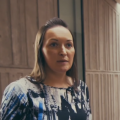
Louise O’Kane, Community Places[Essential Partners’] technique is used to explore contentious or divisive issues. So looking at renewable energy we thought this was an ideal opportunity to explore all the complexities of that issue. I found it a really useful method, and although this is the first time we’ve used it I am sure we’ll be using it again.
Northern Ireland, UK

Belle AbayaTogether, we married our ideas to create a dialogue model that took into consideration our young people’s particular needs, and our culture.
The Conflict Resolution Group Foundation, Philippines

Misty Stoll, School Board TrusteeI ran for my local school board in 2018 and was elected. I use the skills in our meetings, whether I’m chairing the meeting or not. This makes the meetings much more productive. We don’t go over the same topics over and over again.
Wyoming

Meirav Solomon ’20Dialogue not only teaches you how to interact and understand more deeply those around you, it also teaches you more about the world around you and yourself. I think dialogue is super important to my growth as a student, a global citizen and a human being. I have learned to listen, I have learned to speak out, I have learned how to access my stretch zone (where I feel uncomfortable speaking but not turned off) and I have learned where my limits are.
Cary Academy, NC

Nicki Glasser, Policy CoordinatorWhat surprised me was how much you could transform a relationship during a three-hour conversation.
Transformation Center, Massachusetts

Etionette Nshirmirimana, Burundian Master TrainerI realized that by using the “dialogue” approach, people could talk of what is deep in their heart, especially things that have harmed them.
Burundi

Program ParticipantI did not anticipate having as many concrete takeaways as I do. I feel there is an immense practical application.

Misty Stoll, School Board TrusteeThe Sheridan Community has changed in the best way since the Essential Partners training. The Center for a Vital Community has been holding monthly dialogues. I’m going to facilitate the upcoming one. What’s great is that we’re attracting a much more diverse group of participants. There are always the regulars who come, but now we’re also getting conservative Republicans to come as well—politicians come, even the Sheriff comes.
Wyoming
